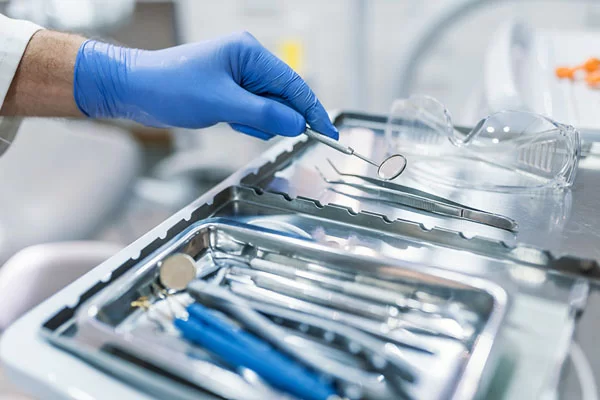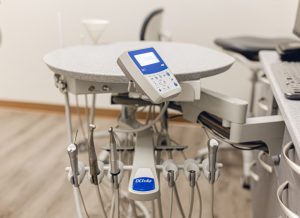How Dentists Clean Your Teeth
Dental cleanings are a cornerstone of maintaining oral health and preventing common issues like tooth decay, gum disease, and bad breath. During a cleaning, dental professionals remove plaque, tartar, and other debris from the teeth and gums, promoting a healthy smile.
At our Farmington, CT, dental office, we use advanced tools and techniques to ensure a thorough and effective cleaning for every patient. Call us at (860) 470-3660 to schedule your appointment with our Farmington dentist. Let’s explore the tools and techniques our dental team uses to provide comprehensive oral care and achieve excellent results.
Tools and Techniques Used for Dental Cleanings
Scaling and Root Planing
One of the most effective techniques for cleaning teeth is scaling and root planing, especially for patients with early-stage gum disease.
- Scaling removes plaque and tartar from above and below the gum line.
- Root planing smooths the tooth’s root surfaces to prevent further plaque buildup and support healthy gums.
This dual approach helps reverse early signs of periodontal disease and protect your natural teeth.
Polishing Tool
After scaling, polishing helps smooth the tooth surface, making it harder for plaque and tartar to accumulate. This process not only promotes a clean feeling but also helps prevent tooth decay and gum disease.
Dental Explorer
The dental explorer is a small, sharp instrument with a flexible, angled tip. Dentists use it to:
- Detect tooth decay and other oral health problems.
- Assess the depth of cavities or gum pockets.
This tool helps dental professionals identify issues early, ensuring timely and effective treatment.
Dental Scaler
A dental scaler is designed to remove plaque and tartar from hard-to-reach areas, including beneath the gum line. Its pointed or curved tip allows precise cleaning, supporting good oral hygiene and reducing the risk of gum disease.
Ultrasonic Scaler
For faster, more efficient cleanings, we use an ultrasonic scaler. This tool utilizes high-frequency vibrations to break apart hardened tartar while being gentle on your teeth and gums. It’s particularly useful for patients with significant buildup or crooked teeth.
Dental Mirrors
Small but essential, dental mirrors provide visibility to areas of the mouth that are difficult to see. They help dentists and hygienists examine the oral cavity, identify issues, and ensure no spot is missed during your routine cleanings.
Curette
A curette is a specialized tool for removing plaque and tartar from below the gum line, crucial for maintaining healthy gums. Its sharp, hook-like tip reaches areas that regular brushing and flossing cannot.
Suction Device
A dental suction device keeps your mouth dry during cleanings and other dental procedures by removing saliva and debris. This ensures a clean workspace for the dentist and adds comfort for the patient.
Dental Floss
Flossing is a critical step in removing plaque and food particles from between the teeth. During a cleaning, dental hygienists may demonstrate proper flossing techniques, ensuring patients know how to maintain good oral hygiene at home.
Water Syringe
A water syringe rinses away debris during cleanings and is particularly helpful for patients with dental appliances like braces. It ensures a fresh, clean feeling after your visit.
X-Rays
Dental X-rays are a valuable diagnostic tool, helping detect problems like cavities and bone loss that aren’t visible during a standard exam. These images allow dentists to provide more effective treatment and prevent future issues.
Frequently Asked Questions
Yes, water syringes are generally safe for individuals with sensitive teeth. However, always inform your dentist about any discomfort or concerns so they can adjust the pressure settings or recommend alternative solutions.
Dental floss involves wrapping the floss around your fingers and gently sliding it between your teeth. Curve the floss into a C-shape against each tooth and move it up and down to remove plaque or food particles. Use a fresh section of floss for each tooth to prevent spreading debris.
Taking a pain reliever beforehand is often safe and can help minimize discomfort during a cleaning. Always consult your dentist for recommendations based on your medical history.
There aren’t necessarily any best dental tools. The best dental tools will depend on the specific needs of the dental procedure being performed. Some of the most common dental instruments used are dental drills, mouth mirrors, dental scalers, and dental syringes.
Schedule Your Dental Cleaning Today!
At our Farmington dental office, we combine the latest dental tools and techniques with a focus on patient comfort. Whether it’s your first cleaning in years or a routine visit, we’re here to provide the thorough and effective cleaning you deserve.
Contact us at (860) 470-3660 to book your appointment today. We proudly serve Farmington, Plainville, New Britain, Hartford, Newington, and surrounding areas in Connecticut.

